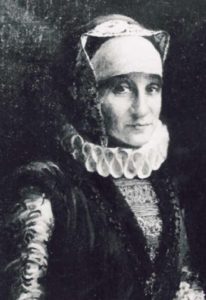The World’s Coolest Hats
 Yakov Henryk Spreiregen (1894-1982) was born to a Jewish family in Warsaw. The family immigrated to France when he was a young man—where he changed his name to Jacques—and then to England to escape the First World War. Spreiregen found a job working for a hatmaker, but was soon called up to serve in the military. After returning to England following his service, he started importing military-style berets from France. He then began making his own hats from high-quality angora wool. In 1938, Spreiregen leased an old thread factory in northwest England and founded Kangol (a name he made up from “knitting angora wool”). The company initially struggled to turn a profit, and many of the first employees were his own family members. Eventually, the hats did become popular, and earned a reputation for quality and durability. During World War II, Spreiregen won a contract to outfit the British army with berets. By the end of the war, he was making a million hats a year! Kangol later outfitted the English Olympic team, and the crew of British Airways. The company went public in 1952. Two years later, Spreiregen started a new division to produce helmets and seat belts. Kangol went on to become the largest seat belt manufacturer in Europe. In 1964, Kangol made a deal with The Beatles to make their branded hats. Soon, Kangol hats were popular among American hip hop artists, too, and have since been sported by the likes of Grandmaster Flash, Madonna, Brad Pitt, and Princess Diana. The most famous wearer of Kangol hats is undoubtedly Samuel L. Jackson, who has said that it’s a family tradition going back to his grandfather. Spreiregen retired from the company in 1972. Just a few years later, it would officially become the world’s largest hatmaker. Because Americans would often ask for the “kangaroo” hats when shopping, Kangol made their logo a kangaroo in 1983, a year after Spreiregen passed away.
Yakov Henryk Spreiregen (1894-1982) was born to a Jewish family in Warsaw. The family immigrated to France when he was a young man—where he changed his name to Jacques—and then to England to escape the First World War. Spreiregen found a job working for a hatmaker, but was soon called up to serve in the military. After returning to England following his service, he started importing military-style berets from France. He then began making his own hats from high-quality angora wool. In 1938, Spreiregen leased an old thread factory in northwest England and founded Kangol (a name he made up from “knitting angora wool”). The company initially struggled to turn a profit, and many of the first employees were his own family members. Eventually, the hats did become popular, and earned a reputation for quality and durability. During World War II, Spreiregen won a contract to outfit the British army with berets. By the end of the war, he was making a million hats a year! Kangol later outfitted the English Olympic team, and the crew of British Airways. The company went public in 1952. Two years later, Spreiregen started a new division to produce helmets and seat belts. Kangol went on to become the largest seat belt manufacturer in Europe. In 1964, Kangol made a deal with The Beatles to make their branded hats. Soon, Kangol hats were popular among American hip hop artists, too, and have since been sported by the likes of Grandmaster Flash, Madonna, Brad Pitt, and Princess Diana. The most famous wearer of Kangol hats is undoubtedly Samuel L. Jackson, who has said that it’s a family tradition going back to his grandfather. Spreiregen retired from the company in 1972. Just a few years later, it would officially become the world’s largest hatmaker. Because Americans would often ask for the “kangaroo” hats when shopping, Kangol made their logo a kangaroo in 1983, a year after Spreiregen passed away.
14 Facts You Should Know About the Book of Psalms
Words of the Week
The real danger of antisemitism is not what others think of us, but what it makes us think of ourselves.
– Rabbi Manis Friedman


